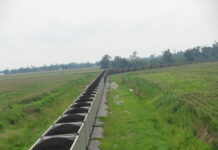Photo credit: DiasporaEngager (www.DiasporaEngager.com).
Israeli politician and former Ambassador Danny Danon attributed US President Joe Biden’s increasingly critical posture toward Israel’s war on the Hamas terrorist group to domestic political concerns and the upcoming presidential election in a wide-ranging interview with The Algemeiner.
Danon, a current member of the Israeli parliament for the Likud party and former ambassador to the United Nations, spoke with The Algemeiner to discuss the ongoing war against the Hamas , potential escalation in northern Israel with the Hezbollah terrorist organization, and the evolving politics of the US-Israel relationship.
Asked about Biden’s pressure on Israel not to enter Rafah — the last Hamas stronghold in Gaza — and to agree to a ceasefire, Danon said, “You know, a ceasefire without us bringing the hostages back and defeating Hamas, it means that Israel will lose this war.”
“I don’t think that President Biden and other allies of Israel are actually supporting the stand of Israel losing the war,” he continued, arguing that “they have other interests in moving forward because of the election in the US and international pressure, but we have a different timeline.”
When asked to clarify if he believed the upcoming presidential election in the US was fueling Biden’s current policy toward Israel — especially in the form of public and private pressure — Danon reiterated that he believes “it’s a combination of the election and also international pressure.”
In several US states, activists have been campaigning for voters not to support Biden in the Democratic primary due to his overall support for Israel. In Michigan, for example, a key battleground state and home to America’s largest Arab population, a campaign to vote “uncommitted” during the state’s primary rather than for Biden gained significant support. Some prominent observers have suggested that the Biden administration’s changing position on Israel and the war in Gaza may be influenced by domestic political fears of losing electoral support from anti-Israel voters.
Meanwhile, amid escalating tensions on Israel’s northern front with Hezbollah, which wields significant political and military influence across Lebanon, Danon made it clear that Israel would remove the threat of Hezbollah on its border one way or another.
Since Hamas’ Oct. 7 massacre across southern Israel, “tens of thousands of Israelis have been evacuated from the northern communities” due to the rockets launched by Hezbollah on a nearly daily basis, he explained. In total, more than 2,000 rockets, along with many more anti-tank guided missiles and drones, have been launched into Israeli territory since the war began.
“They … have to be able to go back to their homes. In order for them to go back, we … have to push Hezbollah away from the border,” he said. “So that’s the end game.”
How that may happen in practice remains uncertain: “One option is to have negotiations and to prevent the conflict,” he said. “And the second option is to have a limited conflict. And the third option is to have a full war with Hezbollah.”
Regardless, he added, in the end Hezbollah “will not be on the fence and they will not threaten our communities.”
The interview took place prior to last week’s airstrike on Iran’s consulate in Damascus, Syria last week that Iranian officials have attributed to Israel.
The strike killed seven members of Iran’s Islamic Revolutionary Guards Corps (IRGC), a US-designated terrorist organization, including two senior commanders.
Israel has neither confirmed nor denied involvement in the incident. However, Israel has been bracing for a retaliatory strike amid a flurry of public threats from Iran to attack Israel.
Another important issue that has captured the attention of the citizens of Israel and the entire Jewish world is the continued captivity of more than 130 people in Gaza who Hamas terrorists kidnapped during their Oct. 7 rampage. Liberated captives testified to surviving sexual assault, torture, and starvation.
“When you deal with the [sic] irrational enemy like Hamas, it’s very challenging [to negotiate a deal],” Danon said. “I think we should apply more force, more military force, and that will encourage Hamas to negotiate another agreement that will release more hostages.”
Some of the more than 250 hostages seized on Oct. 7 were released as part of a temporary Israel-Hamas truce in November.
Pushed on why there has not been another agreement since then, he explained, “The challenges that we are facing are not easy. Both the one that requires the defeat of Hamas, you know, we pay a very heavy toll every day, more and more soldiers are paying the price of their lives in order to achieve this goal.”
“And also the hostages,” he added. “It’s very hard for them, the conditions are unbearable, and we are aware of the ongoing atrocities. So it is hard, but I think it’s a challenge for us to be determined. And I think at the end of the day, despite the difficulty, we are determined to win this war, and we will win this war.”
Some Israelis have criticized the government for prioritizing military victory and politics over the return of the hostages. One family member of a hostage said at a rally recently that Prime Minister Benjamin Netanyahu’s “concern for coalition stability outweighs his clear duty to bring our loved ones home … We were told to sit still, we were told to travel the world, but after six months, the hostages are still in Gaza! This is a complete and deliberate failure!”
Nevertheless, Danon is singularly focused on winning the war against Hamas and bringing home the hostages.
“I think the enemy underestimated the strength of the people of Israel, and they will realize that we are a strong nation and that’s why we will defeat them,” Danon concluded, underscoring the way in which this war has, in many ways, brought Israelis together in an unprecedented way.
Source of original article: Israel – Algemeiner.com (www.algemeiner.com).
The content of this article does not necessarily reflect the views or opinion of Global Diaspora News (www.GlobalDiasporaNews.com).
To submit your press release: (https://www.GlobalDiasporaNews.com/pr).
To advertise on Global Diaspora News: (www.GlobalDiasporaNews.com/ads).
Sign up to Global Diaspora News newsletter (https://www.GlobalDiasporaNews.com/newsletter/) to start receiving updates and opportunities directly in your email inbox for free.

































